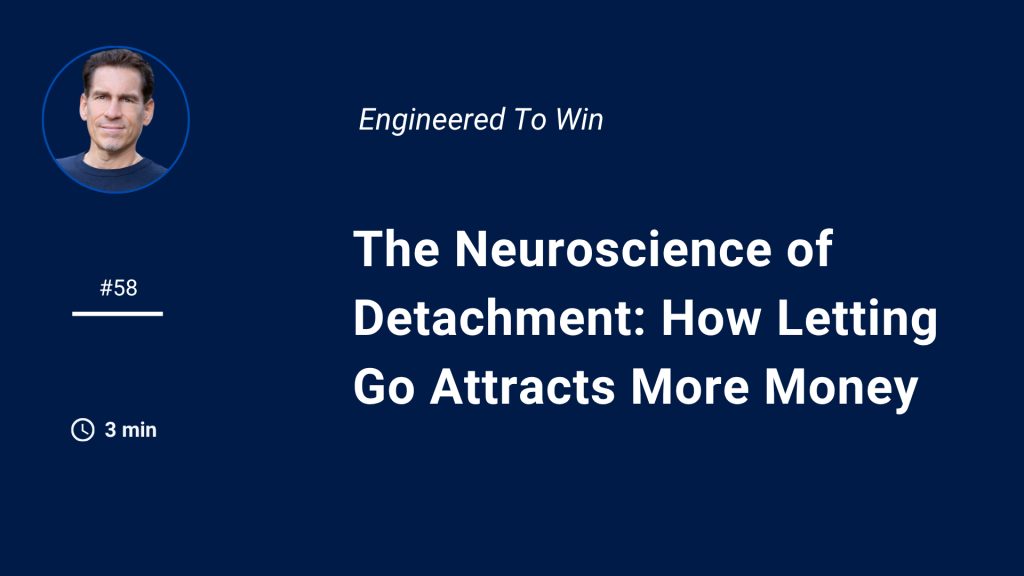Most people chase money because they’re subconsciously afraid of losing it.
But neuroscience shows that attachment to money activates the same threat circuits as physical danger—triggering fear-based decisions, overworking, and scarcity.
The neuroscience of detachment reveals a paradox: the moment you stop clutching money from fear, your brain opens the circuits that attract and multiply it.
💡 The Scarcity Loop Hidden in Your Nervous System
Your brain doesn’t distinguish between losing money and losing safety.
When you obsess over cash flow, markets, or clients, your amygdala interprets it as threat and hijacks your prefrontal cortex—the part responsible for vision, creativity, and long-term strategy.
That’s why you can’t think your way out of financial stress: the brain literally shuts off high-level reasoning when you feel unsafe.
You’re not “bad with money.”
You’re just stuck in the biological stress loop designed to survive, not to prosper.
🧠 What the Science Says
A Harvard neuroscience study found that financial stress increases cortisol and amygdala activation, reducing problem-solving capacity by up to 13 IQ points—the equivalent of missing a night’s sleep.
Meanwhile, mindfulness-based “detachment training” reduced cortisol by 32% and improved reward prediction accuracy—the brain’s ability to anticipate long-term payoffs rather than short-term gains.
In short:
When you stop trying to control money, your brain becomes better at creating it.
💭 The Control Trap CEOs Fall Into
Founders often believe that obsessing over cash flow or profit margins is discipline.
But obsession isn’t strategy—it’s attachment disguised as productivity.
Attachment says, “If I don’t watch it constantly, I’ll lose it.”
Detachment says, “Money flows through systems, not stress.”
Every hour spent gripping financial control tightens your nervous system and narrows perception.
You stop seeing opportunity and start scanning for threat.
Your creative, visionary mind goes offline.
You don’t need to earn peace of mind.
You need to retrain your nervous system to feel safe in uncertainty.
🧰 How to Rewire Your Money Attachment
Letting go isn’t mental—it’s neurological.
Here are three founder protocols to release control and unlock wealth flow:
1. Name the Fear Behind the Number
Before looking at your accounts, pause.
Ask: What’s the emotion I expect this number to confirm or deny?
You’re not tracking dollars—you’re tracking safety signals.
Labeling the emotion (fear, guilt, pressure) calms the amygdala and reactivates the rational brain.
2. Detach Before You Decide
Before any financial move—investment, hire, price increase—say aloud:
“Whether this multiplies or not, I’ll grow wiser either way.”
This prefrontal reframe tells your brain the outcome isn’t survival—it’s learning.
That shift from survival to curiosity unlocks pattern recognition, risk calibration, and abundance perception.
3. Install the Meta Observer
Spend one minute each morning noticing a recurring thought about money—without judging or changing it.
You might catch:
- “There’s never enough.”
- “I need to prove my worth.”
- “If I slow down, I’ll lose it.”
Watch it like weather.
That awareness is metacognitive mapping—thinking about what you’re thinking.
I have logged thousands of these maps, helping founders see that their money problems aren’t in spreadsheets—they’re in subconscious scripts.
💰 Case in Point
One founder I worked with made $8M a year yet couldn’t relax.
He checked cash flow dashboards five times a day.
When we mapped it, his attachment wasn’t to money—it was to control.
He feared that if he didn’t watch the system, it would collapse.
We replaced “monitoring” with “mastery.”
He detached from outcome, focused on pattern clarity, and delegated finance reviews.
Within two quarters, profit rose by 19%—and his anxiety dropped by half.
Money followed safety, not stress.
Want to go deeper? Read Money Works for You: The Neuroscience of Effortless Income → to see how your brain’s reward system turns ease into income when you stop forcing results.
🧠 Expert Insight
Dr. Judson Brewer’s work on habit loops shows that when you replace fear-based control with curiosity, the brain rewires its reward circuits.
“Curiosity feels better than fear, so the brain learns to prefer awareness over avoidance.”
Translation: when you stop gripping, you gain.
That’s why your biggest financial leaps come after emotional release, not intellectual grind.
⚡ 24-Hour Challenge
For the next 24 hours, try this:
Before checking your bank account, take one slow inhale and say—
“I’m safe whether this goes up or down.”
Then check the number.
Notice how your body feels.
That’s your nervous system learning neutrality—the birthplace of wealth expansion.
Bonus: If you feel tension, shake it out. Literally. Movement releases stress hormones faster than thought alone.
🧭 Closing Thought
You don’t attract what you want. You attract what your nervous system believes is safe.
Money doesn’t flow to the most talented.
It flows to the most regulated.
Reflection question:
Where are you still gripping money out of fear—and what might open up if you trusted flow instead of control?
🧩 Recommended Tool
Insight Timer – “Non-Attachment Meditation” by Tara Brach.
It helps train the same neural pathways involved in emotional regulation and financial clarity.
📩 Call to Action
Run the 24-hour detachment experiment. Then reply and tell me:
What shifted when you stopped controlling money and started observing it?
Next week: Why Your Nervous System Decides Your Net Worth (Before Your Mind Does).

